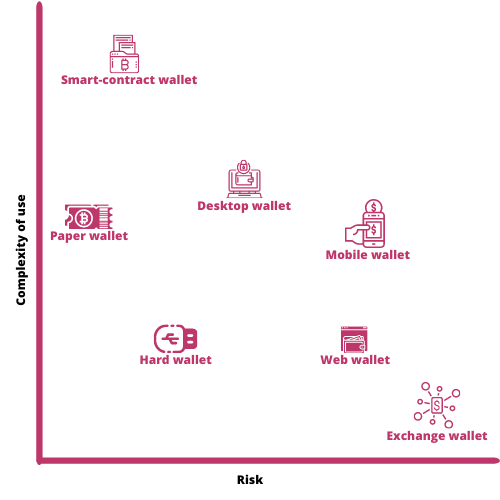In total, around $3 billion worth of crypto-assets were stolen in 2020. These kinds of theft can happen for many reasons and the biggest one is coming from users themselves. When it comes to using a proper email address, to set up a strong password or to enable the 2FA authentication, these elements sometimes lead to weaknesses and thus, a workable breach for hackers. Choosing the most suitable security to your needs is the key to protect yourself from attacks. Encrypted wallets may be the solution.
There are two big families of wallets, that we usually call Hot Wallets and Cold wallets. Hot wallets are always connected, and the vast majority are made for on-the-go transactions. Cold wallets can store your cryptocurrencies offline. Each of them have their advantages and disadvantages, and we are here to find out which suits you the best. We explain in another article how a wallet works.
How to define the security level of a wallet ?
Before entering in which type of digital ledger is the right for your needs, let’s begin with what defines the security of a wallet :
- the email and password setup and the recovery ability in case it’s lost
- the 2FA setup if it is possible
- the private key, custodial or non-custodial. A private key is called non-custodial when you are the sole owner of it and thus of the access to your funds. Custodial is when the private key is stored by a third party in its servers.
- the recovery seed phrase
Hot wallets
Leaving cryptocurrencies on an exchange
The first thing you do when discovering crypto-currencies is to set up an account on an exchange and buy your cryptocurrencies on its platform. And when doing so, you have the opportunity to leave them there. But this practice represents two issues. Firstly, and referring to user issues above, you can be hacked. And secondly, the platform can be hacked.
This second part cannot be resolved on your side and so you must choose a reputable platform that has already proven its resilience and confidence given by its community. The first issue however can be improved drastically. By first changing your email from a personal one to a dedicated one not related to any other type of account revealing personal information (like an amazon account for example), by complexifying your password and changing from a SMS 2FA to a auto-generated 2FA.
Well, on the bright side you can leave the security-management part of your assets mostly to the platform you are using, an email, a password and it’s all done. And in exchange, the platform generates you addresses that allows you to receive, withdraw and exchange cryptocurrencies. And most importantly, since all your addresses are linked into the exchange, you can trade almost instantly.
On the other side, you can’t manage your addresses, and the private keys are stored by the exchange platform and they won’t allow you to use them freely. And so if the company offering the trading services gets hacked or worse,decides to run with your money, you might not be able to recover your funds.

Web wallet
What we can call “web wallets” are wallets available on the web, mostly free, and easily accessible as long as you have an internet connection. These can either be wallet available on a website like Myetherwallet, as a browser extension like the Brave wallet or Metamask. Since you will be storing your cryptocurrency on the internet you might be less protected than on other types of wallets and you might still be the target from fishing and other types of attacks.

Desktop & Mobile wallet
Desktop wallets are softwares allowing you to store your cryptocurrencies, and some may differ in their use. Whether you are on Linux, Windows or Mac, these wallets allow you to have total control over your private keys and your funds. The majority of the desktop wallet users are motivated by the variety of cryptocurrencies you can store in it. Additionally, some may offer a trading service integrated, a convenient way to exchange quickly and simply your cryptocurrencies in one place.
Mobile wallets tend to be the same as desktop wallets, some are even connected from desktop to mobile. The major difference lies however in the portability of your wallet. If it is on your smartphone, you can have it wherever and whenever you need it. But walking around with all your cryptos in your pocket is also the biggest risk of this type of storage. Even with a recovery phrase and most of the safety precautions enabled, you would be putting your funds at risk in case of a loss or a theft on your device.

Smart-contracts wallets
Smart contracts wallets are usually built on the ethereum blockchain. Due to their specific nature they have unique abilities. Among them you can find the 2FA authentication, the social recovery, which is the recovery of your private key through third parties, rate limited withdraws, personal whitelist and blacklists, fraud alerts and emergency lockdown. Most of these features are encoded through an open source code and it might be complex for beginners to handle this wallet. We explain that in another article about how smart contract wallets work.

Cold wallets
Contrary to Hot wallets, cold wallets store a user’s public address and a private key offline. The fact that they are not connected to the Internet allow their users, through their software or via encrypted keys, to manage and send cryptocurrencies without compromising their funds or private key.
Hardware wallet or “hardwallet”
Contrary to Hot wallets, cold wallets store a user’s public address and a private key offline. The fact that they are not connected to the Internet allow their users, through their software or via encrypted keys, to manage and send cryptocurrencies without compromising their funds or private key.

Paper Wallet
This type of wallet, simply put , is the most secure wallet to store crypto currency offline. You can generate them off of certain websites creating a public and a private key on a file you can later print out on a piece of paper. You can choose to laminate your piece of paper, engrave it on a piece of metal it’s up to you !

Conclusion
A wallet is the combination between the choice of an online or offline risk and its ease of use. Old school guys will tell you that nothing beats a paper wallet while the fanboys will argue over which hardware wallets are the best. Overall, you now have all the pros and cons of each wallet to make an informed choice. Good luck !




